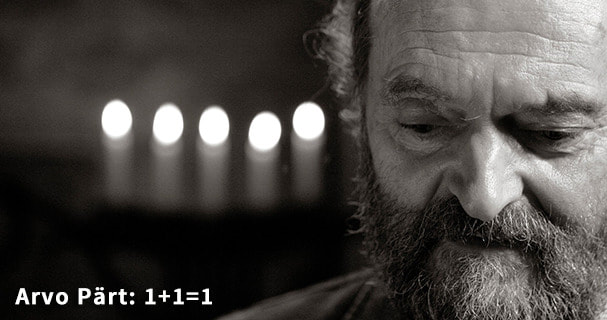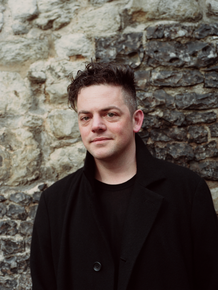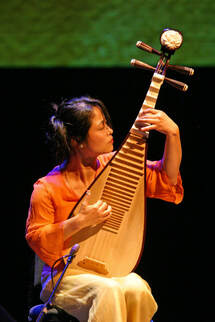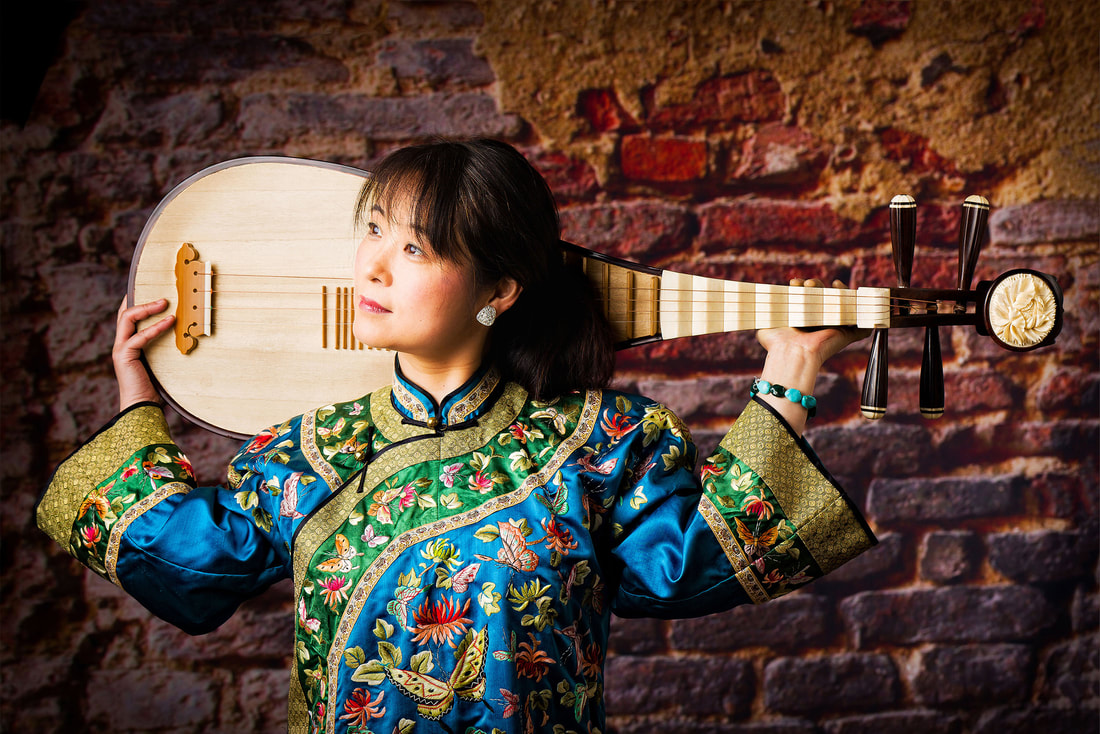Fratres by Arvo Pärt
All Perfections Keep by Nico Muhly
1. I Saw My Lady Weep, theme by John Dowland, arr. Nico Muhly
2. Variations
Flow My Tears by John Dowland
Glimpses of Muqam Chebiyat by Wu Man
1. Muqaddima
2. Third Dastan
All Perfections Keep by Nico Muhly
1. I Saw My Lady Weep, theme by John Dowland, arr. Nico Muhly
2. Variations
Flow My Tears by John Dowland
Glimpses of Muqam Chebiyat by Wu Man
1. Muqaddima
2. Third Dastan
Performed by:
John Sipher, trombone
Annie Trépanier and Asher Wulfman, violins
Catherine Beeson, viola
Heidi Hoffman, cello
John Sipher, trombone
Annie Trépanier and Asher Wulfman, violins
Catherine Beeson, viola
Heidi Hoffman, cello
Program Notes
Arvo Pärt (1935- )
Arvo Pärt is an Estonian composer primarily known for writing in a minimalist style which is heavily influenced by Gregorian chant. From 2011 to 2018 and again in 2022 Pärt was the most performed living composer in the world. This popularity didn't come without struggle. His early works were banned by Soviet censors during Russia's extended occupation of Estonia for their "susceptibility to foreign influences" and religious expression. He withdrew during this period and nearly ceased composing altogether, instead studying European Renaissance and Medieval music. The particular minimalist technique Pärt created, tintinnabuli (bells), came as a result of that period of study. Of this style and technique - meditative, typically in a slower steady tempo, and often utilizing sacred texts - Pärt has written “Time and timelessness are connected. They represent the instant and eternity struggling within us.” He has been composing in this style since 1976. About Pärt's music, composer Steve Reich has said "I love his music, and I love the fact that he is such a brave, talented man… He's completely out of step with the zeitgeist and yet he's enormously popular, which is so inspiring. His music fulfills a deep human need that has nothing to do with fashion." About his own music, Pärt has said "I could compare my music to white light which contains all colours. Only a prism can divide the colours and make them appear; this prism could be the spirit of the listener."
Fratres was composed in 1977 near the very beginning of his emergence after being censored by the government and at the start of his minimalist tintinnabuli work. It exemplifies this technique, which Pärt has described as "the mathematically exact connection from one line to another.....tintinnabuli is the rule where the melody and the accompaniment [accompanying voice]...is one. One and one, it is one – it is not two. This is the secret of this technique. The whole secret of tintinnabuli lays in the two lines. One line is who we are, and the other line is who is holding and takes care of us. " Fratres is a set of variations separated by a rhythmic figure called the "refuge", and was written as a three-part piece - drone, melody, and harmony - intended to be played "without fixed instrumentation", meaning any grouping of instruments as long as the three-part technique was followed. It is most often performed as a violin and piano duet but many variations for larger ensembles have been performed and recorded. The string quartet version is among the most meditative, conjuring a kind of eternal truth and stillness. This is a first performance of Fratres and of Arvo Pärt's music at Loon Lake Live.
Fratres was composed in 1977 near the very beginning of his emergence after being censored by the government and at the start of his minimalist tintinnabuli work. It exemplifies this technique, which Pärt has described as "the mathematically exact connection from one line to another.....tintinnabuli is the rule where the melody and the accompaniment [accompanying voice]...is one. One and one, it is one – it is not two. This is the secret of this technique. The whole secret of tintinnabuli lays in the two lines. One line is who we are, and the other line is who is holding and takes care of us. " Fratres is a set of variations separated by a rhythmic figure called the "refuge", and was written as a three-part piece - drone, melody, and harmony - intended to be played "without fixed instrumentation", meaning any grouping of instruments as long as the three-part technique was followed. It is most often performed as a violin and piano duet but many variations for larger ensembles have been performed and recorded. The string quartet version is among the most meditative, conjuring a kind of eternal truth and stillness. This is a first performance of Fratres and of Arvo Pärt's music at Loon Lake Live.
Nico Muhly (1981- )
Nico Muhly is a wildly successful classically trained genre crossing American composer. "It's essentially like being from somewhere. I feel like I'm very proudly from the classical tradition. It's like being from Nebraska. Like you are from there if you're from there. It doesn't mean that you can't have a productive life somewhere else." He is in demand as a classical composer as well as a collaborator and arranger for indie and popular musicians, and a TV&film score composer. Muhly has been commissioned twice to compose operas by the Metropolitan Opera, and has written significant works for both large and small scale ensembles including San Francisco Symphony, St. Paul Chamber Orchestra, Conspirare, and Los Angeles Guitar Quartet. He has also collaborated, created, and arranged music with Björk, Bryce Dessner, and Sufjan Stevens. His influences range from Minimalism to the Anglican choral tradition.
All Perfections Keep is a 2021 composition commissioned by Royal Concertgebouw Orchestra principal trombonist Jörgen van Rijen. It is a set of variations on 16th century English composer John Dowland's "I Saw My Lady Weep". The first movement is an arrangement of Dowland's song presented as a theme. The second movement is the set of variations. In each, the trombone acts both as a featured instrument and part of the fabric of the string quartet group. Muhly's signature hocket or klangfarbenmelodie style Minimalism creates the primary fabric of the variation movement. Hocket is an interlocking melody technique that comes from 13th century Medieval music and is used throughout the world in many different cultures and genres of music, by composers as different as Duke Ellington, Ludwig van Beethoven, and Skrillex. In Balinese gamelan music it's called kotekan. Klangfarbenmelodie (German: tone-color-melody) is the modern terminology for this sort of pointillist technique as used in classical music. All this to say this piece, written for trombone and string quartet, has technical roots in 13th century Medieval music, is inspired by the words and music of a 16th century Renaissance song, and was brought to life by a 21st century Minimalist composer! This is a first performance of All Perfections Keep at Loon Lake Live. We have previously performed Nico Muhly's music at Loon Lake Live in 2017.
I saw my lady weep,
And Sorrow proud to be advanced so,
In those fair eyes where all perfections keep.
Her face was full of woe,
But such a woe believe me as wins more hearts,
Than Mirth can do with her enticing charms.
Sorrow was there made fair,
And Passion wise, tears a delightful thing,
Silence beyond all speech a wisdom rare.
She made her sighs to sing,
And all things with so sweet a sadness move,
As made my heart at once both grieve and love.
O fairer than aught else
The world can show, leave off in time to grieve.
Enough, enough, (enough, enough,) your joyful looks excels.
Tears kill the heart, believe;
O strive not to be excellent in woe,
Which only breeds your beauty's overthrow.
All Perfections Keep is a 2021 composition commissioned by Royal Concertgebouw Orchestra principal trombonist Jörgen van Rijen. It is a set of variations on 16th century English composer John Dowland's "I Saw My Lady Weep". The first movement is an arrangement of Dowland's song presented as a theme. The second movement is the set of variations. In each, the trombone acts both as a featured instrument and part of the fabric of the string quartet group. Muhly's signature hocket or klangfarbenmelodie style Minimalism creates the primary fabric of the variation movement. Hocket is an interlocking melody technique that comes from 13th century Medieval music and is used throughout the world in many different cultures and genres of music, by composers as different as Duke Ellington, Ludwig van Beethoven, and Skrillex. In Balinese gamelan music it's called kotekan. Klangfarbenmelodie (German: tone-color-melody) is the modern terminology for this sort of pointillist technique as used in classical music. All this to say this piece, written for trombone and string quartet, has technical roots in 13th century Medieval music, is inspired by the words and music of a 16th century Renaissance song, and was brought to life by a 21st century Minimalist composer! This is a first performance of All Perfections Keep at Loon Lake Live. We have previously performed Nico Muhly's music at Loon Lake Live in 2017.
I saw my lady weep,
And Sorrow proud to be advanced so,
In those fair eyes where all perfections keep.
Her face was full of woe,
But such a woe believe me as wins more hearts,
Than Mirth can do with her enticing charms.
Sorrow was there made fair,
And Passion wise, tears a delightful thing,
Silence beyond all speech a wisdom rare.
She made her sighs to sing,
And all things with so sweet a sadness move,
As made my heart at once both grieve and love.
O fairer than aught else
The world can show, leave off in time to grieve.
Enough, enough, (enough, enough,) your joyful looks excels.
Tears kill the heart, believe;
O strive not to be excellent in woe,
Which only breeds your beauty's overthrow.
John Dowland (1563-1626)
John Dowland was an English composer, singer, and lutenist who trained in France and studied Italian madrigals. His music was celebrated during his lifetime, even though he tended to specialize in fairly intense melancholy songs. OG emo! 😎 He even made a Latin motto for himself "Dowland, semper dolens" (Dowland, always grieving). His music has inspired many composers, and has had a huge resurgence of interest over the past hundred years including crossing over into contemporary popular arenas through recordings by Sting and Elvis Costello, as well as being referenced in the science fiction work of Philip K. Dick.
Flow My Tears is possibly Dowland's most enduring and popular song with countless arrangements and recordings. There are some 100 original manuscripts found throughout Europe, suggesting it was very widely distributed in its time. The piece is based on a slow dance form, pavane, and was first written as an instrumental work before adding lyrics later. According to scholarly research it is likely that Flow My Tears is the natural continuation of I Saw My Lady Weep. I Saw My Lady Weep finishes on an active rather than settled harmony, the kind which is typically found in the midpoint of a musical phrase or the penultimate chord, and Flow My Tears seems to continue the melodic line from where Weep finished. Therefore, we present this Dowland tune here as part of a set! This is TECHNICALLY the second performance of music by John Dowland at Loon Lake Live, since I Saw My Lady Weep precedes it on this program. 🤓😎
Flow, my tears, fall from your springs!
Exiled for ever, let me mourn;
Where night's black bird her sad infamy sings,
There let me live forlorn.
Down vain lights, shine you no more!
No nights are dark enough for those
That in despair their last fortunes deplore.
Light doth but shame disclose.
Never may my woes be relieved,
Since pity is fled;
And tears and sighs and groans my weary days, my weary days
Of all joys have deprived.
From the highest spire of contentment
My fortune is thrown;
And fear and grief and pain for my deserts, for my deserts
Are my hopes, since hope is gone.
Hark! you shadows that in darkness dwell,
Learn to contemn light
Happy, happy they that in hell
Feel not the world's despite.
Flow My Tears is possibly Dowland's most enduring and popular song with countless arrangements and recordings. There are some 100 original manuscripts found throughout Europe, suggesting it was very widely distributed in its time. The piece is based on a slow dance form, pavane, and was first written as an instrumental work before adding lyrics later. According to scholarly research it is likely that Flow My Tears is the natural continuation of I Saw My Lady Weep. I Saw My Lady Weep finishes on an active rather than settled harmony, the kind which is typically found in the midpoint of a musical phrase or the penultimate chord, and Flow My Tears seems to continue the melodic line from where Weep finished. Therefore, we present this Dowland tune here as part of a set! This is TECHNICALLY the second performance of music by John Dowland at Loon Lake Live, since I Saw My Lady Weep precedes it on this program. 🤓😎
Flow, my tears, fall from your springs!
Exiled for ever, let me mourn;
Where night's black bird her sad infamy sings,
There let me live forlorn.
Down vain lights, shine you no more!
No nights are dark enough for those
That in despair their last fortunes deplore.
Light doth but shame disclose.
Never may my woes be relieved,
Since pity is fled;
And tears and sighs and groans my weary days, my weary days
Of all joys have deprived.
From the highest spire of contentment
My fortune is thrown;
And fear and grief and pain for my deserts, for my deserts
Are my hopes, since hope is gone.
Hark! you shadows that in darkness dwell,
Learn to contemn light
Happy, happy they that in hell
Feel not the world's despite.
Wu Man (1963- )
Wu Man is a Chinese composer and internationally acclaimed pipa player. She is a founding member of Yo-Yo Ma's Silkroad project and has recorded and toured extensively with the Silkroad Ensemble. Wu has collaborated with composers Chen Yi, Philip Glass, Lou Harrison, Terry Riley, Bright Sheng, and Tan Dun among others. Her recorded work has earned her 5 Grammy nominations, and she was the first non-Western instrumentalist to be named Instrumentalist of the Year by Musical America. Wu has worked with many ensembles including Stuttgart Chamber Orchestra, Chicago Symphony Orchestra, Kronos Quartet, and The Knights to feature the pipa as an instrument not bound only to its Chinese musical heritage. As a composer and creative collaborator she has co-written an opera, a work for the 2004 Summer Olympics, and a major multi-media work among others.
Wu Man writes, "Glimpses of Muqam Chebiyat is adapted from the Uyghur Muqam Chebiyat. In 2010, thanks to the Aga Khan Music Initiative, I had the opportunity to learn these pieces directly from the Uyghur musicians Abdullah Majnun and Sanubar Tursun. I feel quite grateful to be able to bring these old styles of traditional music—Uyghur Muqam, and ancient pipa music—into the repertoire of Western string ensembles." The first movement title, Muqaddima, is an Arabic for "introduction" or "prologue" meant to introduce a larger work. Accordingly, it has a rhapsodic sensibility to it. The second movement, Third Dastan, refers to a storytelling device. Dastan, a Persian word for "story" or "tale", is an ornate form of oral history from Central Asia, Iran, Turkey and Azerbaijan. These two pieces highlight the sounds and culture of the Turkic speaking Muslim Uyghur ethnic group primarily located in Northwest China, and who have been under extreme cultural suppression by the Chinese government since at least 2017. Working this music into a Western European format of string quartet offers an opportunity for musicians to engage in broader expressive practices on the violin, viola, and cello and at the same time keeps alive the traditions of the Uyghur culture in a growing international context. A longtime partner and collaborator, the Kronos Quartet commissioned these pieces from Wu Man in 2015 to be included in their 50 for the Future project. This is the first performance of the music of Wu Man at Loon Lake Live.
Wu Man writes, "Glimpses of Muqam Chebiyat is adapted from the Uyghur Muqam Chebiyat. In 2010, thanks to the Aga Khan Music Initiative, I had the opportunity to learn these pieces directly from the Uyghur musicians Abdullah Majnun and Sanubar Tursun. I feel quite grateful to be able to bring these old styles of traditional music—Uyghur Muqam, and ancient pipa music—into the repertoire of Western string ensembles." The first movement title, Muqaddima, is an Arabic for "introduction" or "prologue" meant to introduce a larger work. Accordingly, it has a rhapsodic sensibility to it. The second movement, Third Dastan, refers to a storytelling device. Dastan, a Persian word for "story" or "tale", is an ornate form of oral history from Central Asia, Iran, Turkey and Azerbaijan. These two pieces highlight the sounds and culture of the Turkic speaking Muslim Uyghur ethnic group primarily located in Northwest China, and who have been under extreme cultural suppression by the Chinese government since at least 2017. Working this music into a Western European format of string quartet offers an opportunity for musicians to engage in broader expressive practices on the violin, viola, and cello and at the same time keeps alive the traditions of the Uyghur culture in a growing international context. A longtime partner and collaborator, the Kronos Quartet commissioned these pieces from Wu Man in 2015 to be included in their 50 for the Future project. This is the first performance of the music of Wu Man at Loon Lake Live.






